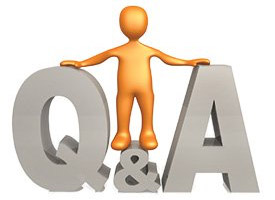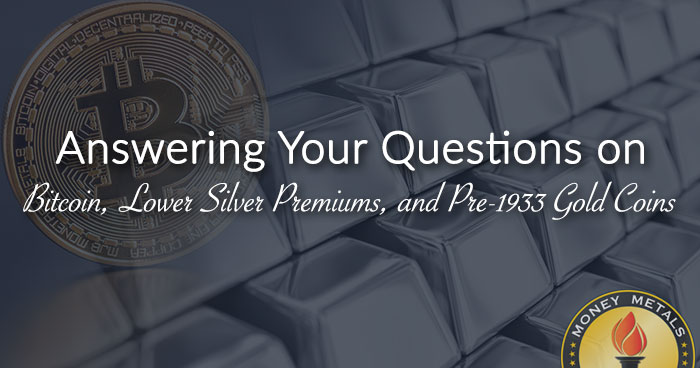
One of the core tenets of our business is educating people who have never owned physical gold or silver. We introduce them to the metals markets and put the spotlight on dishonest money as the foundation for unrestrained government. We get lots of great questions and we like to publish our responses to the most common of them.
Reader Question: What is your take on Bitcoin?
Answer: We believe in honest money. Although flawed, Bitcoin represents a remarkable innovation on that front. That is why Money Metals was among the first bullion dealers to accept Bitcoin payments for precious metals.
If decentralized cryptocurrency proves to be beyond the ability of central bankers and bureaucrats to manipulate or control, it will be a meaningful step forward for personal liberty and a blow to corrupt governments, banks, and markets. It has that potential in common with gold, which imposed restraint on Wall Street and Washington DC right up until Richard Nixon slammed the gold window shut and removed the last bit of integrity from the fiat U.S. dollar.
While Bitcoin and bullion share the potential to work as an alternative money, they are not substitutes for one another. The differences are quite important to consider.
The first distinction is that gold and silver rounds, bullion bars, and coins are tangible assets that will never become worthless. Precious metals are beautiful and serve a useful purpose in goods ranging from jewelry to electronics. They have thousands of years of history serving as money and as a reliable store of value.
Bitcoin, on the other hand, is a very recent phenomenon and a purely digital asset. It may ultimately change the world, but it hasn’t yet stood the test of time. Bitcoin itself must still clear some hurdles.

It needs to become far easier to acquire, safeguard, and use. There are many alternative cryptocurrencies and there is no guarantee Bitcoin will prove itself to be the best mousetrap and survive.
Some technological problems still need to be solved for Bitcoin to scale and serve as a replacement for existing monetary systems. It will need to weather regulatory attacks by bankers and bureaucrats seeking to protect their fiat monetary systems.
While Bitcoin itself has not yet been hacked, several exchanges holding Bitcoin have been.
Lastly, it is important to note that physical bullion is truly “off the grid,” while Bitcoin depends upon the network. Metals don’t need electricity and an internet connection to work. The exact whereabouts of a gold bullion coin cannot be tracked electronically and it will leave no digital fingerprints when used in a discreet transaction. This cannot be said for Bitcoin.
Reader Question: Can I get paid in Bitcoins instead of dollars when selling you my gold and silver?
Money Metals will be adding a great new option for clients interested in transacting in Bitcoin. Customers can already use their Bitcoin to purchase our precious metals products. Soon they will be able to exchange bullion coins, rounds, and bars directly for Bitcoin.
Exchanging metal for Bitcoin or vice versa will be a quick and easy process. And it won’t have the hassle or limits people often encounter when buying or selling Bitcoin with dollars.
Reader Question: I notice the premiums have fallen significantly on silver coins. What is the explanation for that?
Answer: Bullion has transitioned from a seller’s market to a buyer’s market in recent months. Mints, refiners, and wholesalers who had struggled to consistently keep up with demand for several years and responded by raising premiums are reversing course now that demand has fallen.
The election of Donald Trump and optimism over the President’s plans for reforms have temporarily impacted retail U.S. demand for gold and silver. Precious metals have also been underperforming other markets, including stocks, which diminishes safe-haven interest. We suspect buyer fatigue is also playing a role.
In our view, the fundamental reasons to own physical metal are unchanged. The future of the U.S. dollar remains dark. For those who share our view, now looks like the best time to buy silver coins in years.
Reader Question: I know Money Metals recommends staying away from collectibles. Does that mean I should steer clear of ALL pre-1933 gold coins?
Answer: No. The main thing is to ignore the song and dance of some rare coin dealer who wants you to pay a lot more for coins that have been graded as numismatics. Paying “collectible” premiums is a great way to immediately lose 30% or more on your investment.
Every year we sell thousands of circulated U.S. bullion gold coins minted before 1933, and we sell them at premiums that are competitive with modern bullion coins. You can find various old gold coins for sale on our site at these great prices. There is absolutely nothing wrong with buying some of this historic gold, provided you don’t pay any numismatic premium to do it. Make sure you know what the melt value of the precious metal any particular coin contains and don’t pay much more than that.

About the Author:
Clint Siegner is a Director at Money Metals Exchange, a precious metals dealer recently named "Best in the USA" by an independent global ratings group. A graduate of Linfield College in Oregon, Siegner puts his experience in business management along with his passion for personal liberty, limited government, and honest money into the development of Money Metals' brand and reach. This includes writing extensively on the bullion markets and their intersection with policy and world affairs.





